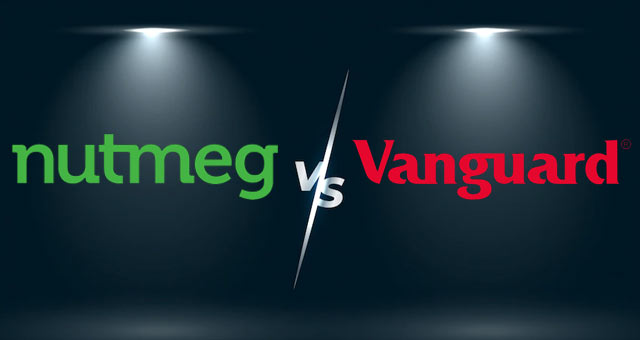Fidelity vs Vanguard 2022: There are numerous options available when it comes to investing. Two of the most popular choices are Fidelity and Vanguard. But which one is right for you? This post will compare and contrast these two investment powerhouses to help you decide.

Fidelity vs Vanguard – Differences Quick Forward
Fidelity and Vanguard offer DIY portfolio services for those who want to be in control of their investments. While fully managed portfolios are for those looking for auto investments.
Junior ISAs, SIPPs, general investment accounts, and stocks are available for all ages through both services.
Vanguard and Betterment provide tools, calculators, and learning resources, but Vanguard may delve further into resources.
When it comes to costs, Vanguard is the way to go. There’s a fixed charge of 0.15% up to a maximum of £375 per year with Vanguard. On the other side, if you have less than $7,500 in assets, Fidelity charges 0.35 per cent. A fee of 0.2% applies if you have £7,500 to £250,000 in investments. Fidelity charges zero maintenance fee if you maintain £1 million of assets.
Both companies offer mobile apps that allow you to manage portfolios on the go. You may also invest via the phone if you don’t want to use a desktop site, but it is another option.
The minimum starting is at least £500 with Vanguard, or you can invest £100 monthly. On the other hand, with Fidelity, you have the option of a one-time payment of £1,000 or £325 per month. Although you can open an account with £0, it won’t let you start investing.
Introduction to Vanguard
Since the 1970s, Vanguard has been trading in the market; it’s been much longer. Moreover, it is among the world’s largest traders dealing online. Since 2017 the online platform has been available to U.K. investors for investing purposes, but many are familiar with the name.
The mutual fund giant has habitually out-competing other firms in its sector. The primary charm of Vanguard may be hidden in the types of funds available through the platform. Moreover, it is worth noting that Vanguard outperformed rivals by about 70% last year in many aspects.
Introduction to Fidelity
Fidelity is a well-known investment provider operating longer than most other online investing brands. Moreover, it was in the financial industry long before the internet existed.
Fidelity has a large customer base, with over a million clients worldwide using Fidelity’s services to handle their money. They have several attractive account offerings, but you’ll be amazed to see the multiple options available as you go more in-depth.
Investment Options Comparison
Unlike some other robot advisers, Vanguard does not demand that you maintain a large minimum deposit. You can either build your portfolio or can use a pre-made portfolio; both are available through Vanguard.
In the case of investing, LifeStrategy is another name for a ready-made portfolio from Vanguard. Either pick one from five available LifeStrategy funds or combine them that suit your risk tolerance and total investment you want to invest over a specific period.
These Managed-portfolios range in risk from low to high and have different allocations of equities and bonds, respectively, depending on risk level. The higher-risk portfolio will include more equities (shares), while the lower-risk alternatives contain many bonds.
However, another ready-made solution from Vanguard is available: “Target Retirement”. It is much similar to Fidelity’s “Retirement Focus”. Target Retirement portfolio allows you to pick up any portfolio tailored for your retirement year. The system will automatically take care of your investments and, if needed, readjust the investment over time for stability and growth to achieve your retirement goals.
On the other hand, Fidelity provides two investing options: an active (DIY) service for those who want to make more investment decisions and a passive approach where you can invest without many choices. Through Fidelity’s “Investment Fund Finder”, you can create your own investment portfolio. You can pick from various mutual funds, equities, and ETFs and can use filters to get the desired results. It is most likely an excellent alternative for people with some investment expertise.
If unsure where to start, consider the 50-fund “Select 50” option. This portfolio contains the best 50 funds carefully selected by the Fidelity team. Fidelity’s ‘Select 50’ targets people who want to be between DIY and managed portfolio investment.
Pathfinder is Fidelity’s risk tolerance service; it asks you a few fundamental questions to assess how much risk is acceptable. The system will then organizes a range of investment funds based on your profile. It allows you to invest your money in what the system believes is the best fit according to your risk tolerance perspective.
Fidelity vs Vanguard Products Offerings
Junior ISAs, Stocks and Shares ISAs, Junior SIPPs, Personal Pensions (SIPPs), and General Investment Accounts are investment products available through Fidelity.
Fidelity also provides a retirement service, in which you may leave it to the Fidelity team to take care of and move your money while you are not working on it. When it comes to investments, Vanguard products are partly similar to that of Fidelity. SIPPs, Junior ISAs, Stocks and Shares ISAs, and General Investment Accounts are available. However, what sets Vanguard apart from Fidelity in the products section is that Vanguard has its own funds only.
Fidelity’s ISA policies say you will invest at least £50 per month. Excluding SIPPs with starting investment of £40, the above rule applies to all of Fidelity’s products. Conversely, you must contribute at least £100 per month for IRAs and SIPPs with an investment through Vanguard. While a deposit of a minimum of £500 if you want to pay a lump sum.
The minimum cap on investment can be a negative aspect for some, but there are other sides to consider. The monthly deposit allows you to invest even with a low budget. Vanguard offers 75 funds that the company owns. But such a pool of 75 options comes with the collective options of Target Retirement and LifeStrategy fund.
On the other side, Fidelity’s investment options are far more flexible with customer choice. Moreover, there is an option to either invest in “Select 50” or go for the full range of funds and individual equities, which numbers to thousands in total.
VanGuard and Fidelity Fees, Costs & Pricing
Things can get confusing here; nevertheless, it’s one of the most critical aspects of the fight between Fidelity vs Vanguard.
Fidelity charges an annual fee of 0.35% if there is an account balance of up to £250,000 in your account. If the balance is less than £7,500 and there are zero monthly deposits, you will be charged a flat fee of £45. The price goes down to 0.2% if you maintain £250,000 account investments. However, the account fee is zero for investors having £1,000,000 in their accounts.
In addition to analyzing Fidelity’s account costs, traders must consider trading charges. There is a £10 fee to trade online in stocks, ETFs, and investment trusts. A benefit of Fidelity is that purchasing or selling funds does not incur any dealer fees. Vanguard’s prices are pretty low compared to Fidelity. There is no account maintenance fee or inactivity fee charged by Vanguard. You will only be captured when you make a trade. The standard commission for stock and ETF trades is approx £7 per trade.
Fidelity, on the other hand, charges a $4.95 commission for stock and ETF trades. It also has an account maintenance fee of $0.35 per month, but this fee is waived if you maintain a balance of $2,500 or more in your account. Fidelity also does not charge any inactivity fees.
Overall, Vanguard’s fees are lower than Fidelity’s fees. However, both firms offer commission-free trading for certain types of securities. For example, Fidelity offers commission-free trading for Fidelity ZERO Index Funds, and Fidelity brokerage customers can trade stocks and ETFs listed on U.S. exchanges without paying a commission. Vanguard also offers commission-free trading for some of its mutual funds and ETFs.
Fidelity and Vanguard have low fees and offer commission-free trades for certain types of securities. When it comes to retirement accounts, Vanguard has an annual fee for IRAs, while Fidelity does not charge any IRA fees. Ultimately, it comes down to your personal investing needs and preferences when choosing between Fidelity and Vanguard.
What are IRAs Fees for Vanguard and Fidelity
Regarding retirement accounts, Vanguard charges a $20 annual account service fee for IRAs. This fee is waived if you maintain a balance of $10,000 or more in your account. Fidelity does not charge any annual IRA fees.
Fidelity vs Vanguard Retail Brokerage Account Fee
| Type of Charge | Fidelity | Vanguard |
| Account fee | $0 | $20 per year |
| Proprietary retail mutual fund investment minimums | $0 | $1000 – $3,000 Investor Shares $3,000 – $100,000 Admiral Shares |
| Mutual funds low balance fee | $0 | $20 per year (On balances under $10K) |
| Account transfer out | $0 | $0 |
| Partial: $25 | $0 | $0 |
| Minimum initial investment | $0 | $0 |
| IRA closeout fee | $0 | $0 |
| Reorganization fee | $0 | $0 |
| Late settlement fee | $0 | $0 |
| Bank wire | $0 | $10 |
| Insufficient funds | $0 | $20 |
| Stop payment | $0 | $15 |
| Bill payment | $0 | $4.95 per month (Requires $500K in Vanguard assets) |
| Account ATM fee | $0 | $0 |
Commission Prices: Vanguard vs. Fidelity
When comparing commission prices for investment products, Vanguard and Fidelity are two of the most popular options. Both companies charge relatively low fees, making them ideal choices for investors looking to minimize costs. However, some key differences between Vanguard and Fidelity can help you decide which one is right for you.
At Vanguard, commissions start at just $7 per trade, regardless of the type or size of your investment. By contrast, Fidelity charges a flat rate fee of $4.95 per trade, making it slightly more affordable if you only plan on trading a small number of stocks or ETFs each month.
If you are an active trader who often makes multiple trades in a single day, Vanguard may be a better option, as their tiered pricing model allows you to enjoy discounted rates as your volume increases. For example, you could pay just $2 per trade for the first 25 trades each month or $1 per trade for the following 50 trades.
However, Fidelity may be a better choice if you plan on making long-term investments and aren’t concerned with day-to-day trading activity. Their flat-rate fees make it easy to budget for your investments over time without worrying about unpredictable commission fluctuations.
When choosing between Vanguard and Fidelity for commission prices, you must consider your investment goals and trading style to determine which company can best meet your needs.
Vanguard or Fidelity? Which is best for Mutual Funds?
There are several factors to consider when comparing Vanguard and Fidelity for mutual funds. On the one hand, Vanguard offers low fees and commission-free trading on specific securities, while Fidelity has more options and flexibility when investing in mutual funds.
Ultimately, the choice between Vanguard and Fidelity will depend on your personal investing preferences and needs. So which is best for mutual funds? The answer may depend on your investment goals and risk tolerance. If you are looking for low fees and commission-free trading, Vanguard may be a good option. However, Fidelity may be a better choice if you want more flexibility and options regarding mutual fund investing.
Vanguard vs Fidelity Learning Resources
Several online resources and tools are available to help investors learn more about Vanguard vs. Fidelity and its offerings. Some good options include the websites for each company, which provide detailed information on investment products and services, as well as educational content aimed at helping investors make smarter decisions with their money.
Other helpful resources include independent financial blogs, investment magazines and books, and online investing forums. Many of these offer information on Vanguard’s or Fidelity’s fees and trading commissions, as well as tips for choosing the correct brokerage account for your needs.
Ultimately, it is essential to do your research before deciding which broker is right for you. Whether you choose Vanguard or Fidelity, take advantage of all the available learning resources to help you make informed decisions about your investments.
Is it Safe to Invest with Fidelity or Vanguard?
When it comes to safety, both Fidelity and Vanguard are large, well-established financial firms with good reputations. The Financial Services Compensation Scheme regulates both companies. It means you are eligible for £85,000 in compensation in case of any mishap. Besides, both companies have extensive experience in the investment world and offer various investment products and services. So, the chances are less for anything wrong to happen, but it’s good to think from all perspectives.
That said, there is always some risk involved when investing, no matter which company you choose. So before making any decisions, follow a simple safe-side rule. Only invest money you can afford to lose, never more than you can afford to lose. In conclusion, both Fidelity and Vanguard are safe choices for investors.
Fidelity Pros and Cons
There are a few key Fidelity pros and cons to consider before investing with this brokerage.
Pros
- A diverse selection of investing goods and services.
- Fidelity offers commission-free trades on U.S. stocks and ETFs.
- Fidelity has low IRA fees.
- Fidelity has a good selection of no-transaction-fee mutual funds.
Cons
- Fidelity doesn’t offer as many commission-free ETFs as some other brokerages.
- Fidelity’s customer service isn’t available 24/7.
- Overall, Fidelity is a good choice for investors who are looking for a wide range.
Vanguard Pros and Cons
Pros
- Vanguard offers some of the lowest fees in the industry.
- Vanguard has a large selection of commission-free ETFs.
- Vanguard offers excellent customer service and support.
Cons
- Vanguard doesn’t offer as many investment products and services as other brokerages.
- Vanguard’s mobile app is not as user-friendly as some other apps.
- Vanguard is a good choice for investors looking for low fees and commission-free ETFs. However, Vanguard doesn’t offer as many investment products and services as other brokerages.
Which is Better Vanguard or Fidelity?
There is no simple answer to this question, as it depends mainly on individual preferences and investment needs. Vanguard may be a better choice for investors looking for low fees and commission-free ETFs. At the same time, Fidelity may be a better option for those who value flexibility and options when it comes to mutual fund investing.
Ultimately, the best way to choose between Vanguard vs. Fidelity is to assess your investment goals, needs, and preferences before choosing a brokerage account. Both Vanguard and Fidelity have extensive experience in the investment world and are generally considered safe choices for investors. However, it is always important to do your research before making any significant financial decisions. So whether you choose Vanguard or Fidelity, take advantage of all the available learning resources to help you make informed decisions about your investments.


